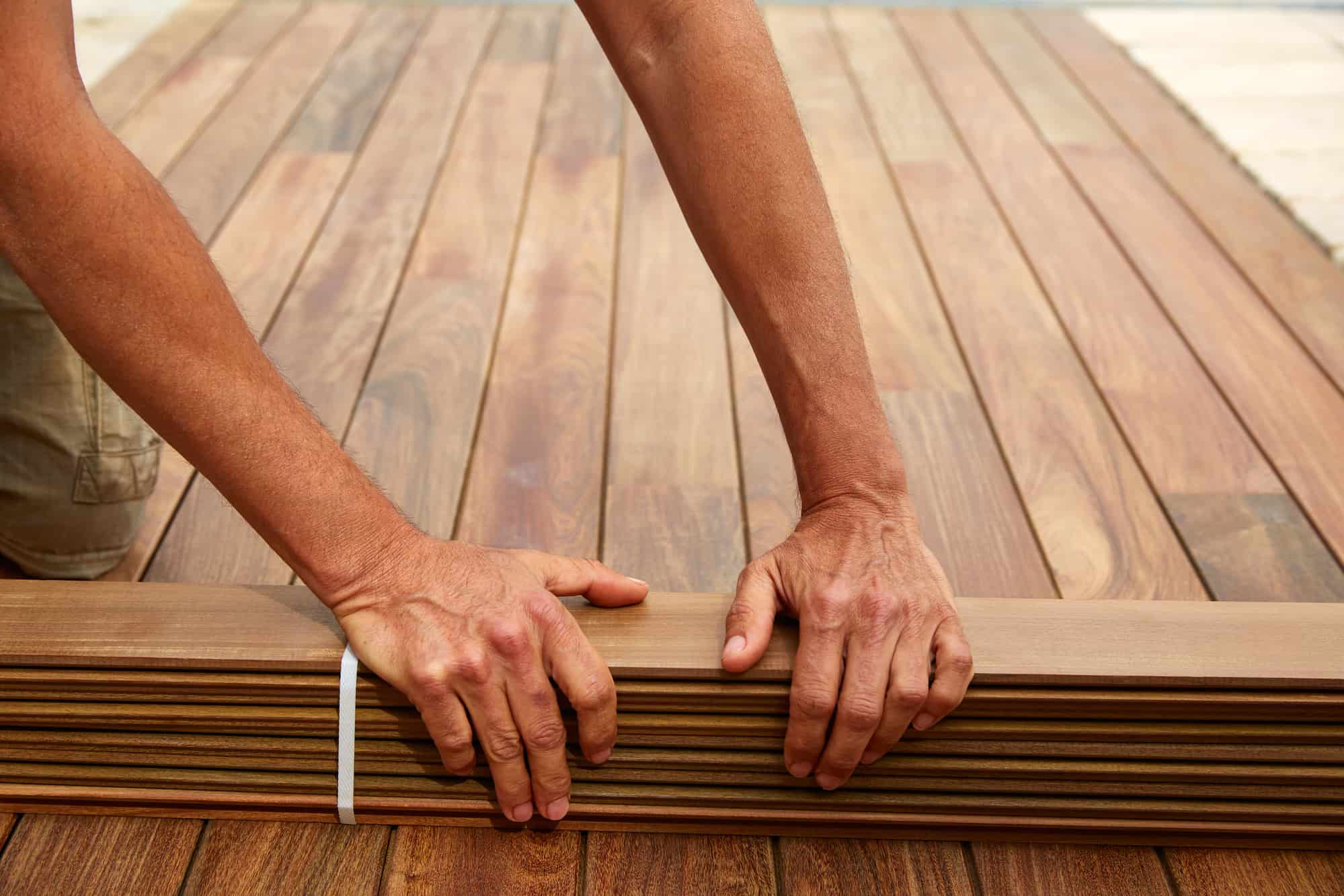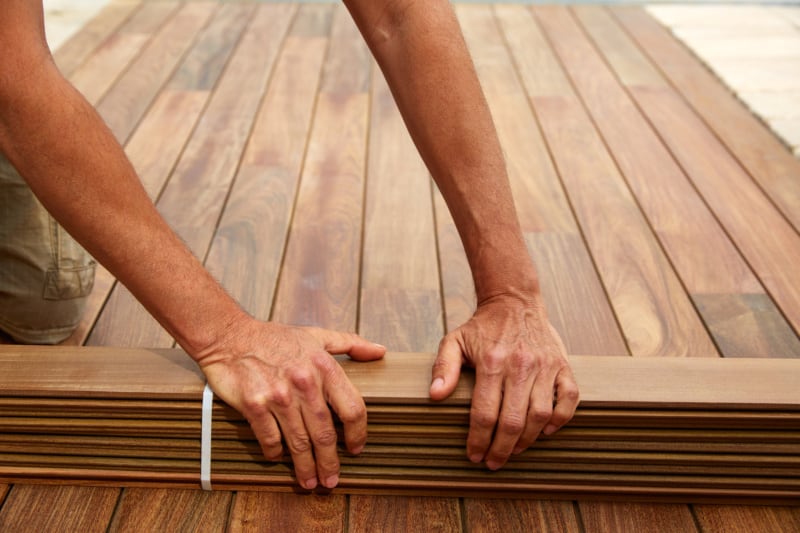
The Differences Between Composite and PVC Decking

If you’re new to the world of deck building, you might assume that all decks are practically the same — it’s just wood, right?
This couldn’t be farther from the truth!
No two decks are created equal, and many decks aren’t even 100% wood. Both composite and PVC decking are made from synthetic materials. So if that’s what they have in common, then how are they different? And which one is best for your future deck?
Well, wonder no more. This guide will explain the major differences between composite and PVC decking so that you can make the best choice for your next outdoor construction project. And once you’ve decided on a material, be sure to stop by your local Decks & Docks location to pick up the premium-quality, marine-grade building materials you need!
What is Composite Decking?
Composite decking is basically a combination of wood pulp and recycled plastic. More specifically, it uses high-density polyethylene (HDPE), a type of plastic commonly used to make milk jugs, buckets, and detergent bottles. The ratio of wood to plastic varies depending on the brand.
Plastic may not be the first thing you think of when it comes to decking material, but composite decking has truly revolutionized outdoor construction. Since its introduction in the late ‘80s, this type of artificial decking has made the dream of building an outdoor gathering space more affordable and accessible for homeowners than ever before.
Compared to natural wood, the plastic in composite decking makes it more resistant to moisture and insects. It also allows for greater style variation – you can choose a custom color and wood grain to match the aesthetic of your home.
What is PVC Decking?
Like composite, PVC is made from artificial materials. But instead of being a mix of wood and plastic, PVC decking is 100% plastic. Like composite, it was designed to minimize maintenance and prevent common problems associated with wood, such as mold and insect infestations.
Easily customizable, PVC can be made to mimic the color of more expensive wood decking options, such as mahogany, ipe, and redwood. And because it’s completely plastic, keeping it clean is a breeze – you can even safely pressure wash this material without fear of splintering.
Capped vs. Uncapped
Both composite and PVC decking materials can be either capped or uncapped. Uncapped decking is the more cost-effective choice, but it is also more vulnerable to staining and mold growth if not carefully maintained.
Capped decking offers extra protection in the form of a hard outer shell. Capping is not an add-on. It’s bonded to the core material during the manufacturing process. In addition to increasing the overall durability and performance of your deck, many caps have UV-inhibitors built in as well. If your deck is exposed to direct sunlight, this will help to prevent fading.
It’s important to keep this in mind when comparing decking options. It wouldn’t be fair to compare uncapped PVC to capped composite decking, or vice versa!
Composite vs. PVC – Which is Better?
Before we get into the major differences, let’s look at what composite and PVC decking have in common. Both materials are:
- Cost-effective
- Low-maintenance
- Durable
- Moisture-resistant
- Insect-resistant
- Scratch-resistant
- Available in a range of attractive color options
As you can tell by their similarities, both composite and PVC are popular, high-quality decking options. So the question shouldn’t be which one is better. Instead, you should ask yourself which best meets your needs.
Advantages of Composite
Natural wood has always been popular because of how it looks. However, composite decking has consistently improved in appearance over the past decades. Now you can find long-wearing composite decking finished to look like real wood.
That brings us to composite’s first major advantage over PVC. Because it does contain wood pulp, composite decking looks more natural. The wood grain also helps to make these decks more slip-resistant than plastic decks. So if you’re building your deck around a pool, that’s something you’ll want to consider – especially if you have young children running around, too.
When the temperature changes suddenly, PVC decking can expand and contract. This makes the structure less stable over time. But because the wood fibers in composite decking make it more rigid, it won’t expand and contract as easily as plastic in direct sunlight.
In summary, the main advantages composite has over PVC are:
- More authentic looking
- Better slip resistance
- Less prone to warping caused by temperature changes
Advantages of PVC
The first big advantage of PVC decking is that it’s 100% recyclable. When a composite deck reaches the end of its lifespan (25 years or more), it’s doomed to end up in a landfill. But plastic decks can be refinished or recycled, giving them new life once their equally long life ends.
Another perk of PVC is mold resistance. Now, we’ve already mentioned that both PVC and composite are resistant to mold. But because composite still contains wood, PVC is the undisputed winner in this category. No organic content means that mold and mildew have nowhere to go.
Finally, PVC is a more lightweight material. This makes it easier to transport and work with, so you can install it pretty much anywhere at any height.
In summary, the main advantages PVC has over composite are:
- 100% recyclable
- More resistant to mold
- Lighter weight
Get High-Quality Lumber for Your Next Project
So, there you have it. Despite their many similarities, PVC and composite decks are like apples and oranges once you know their unique strengths and weaknesses.
No matter what material you decide to use for your new deck, you’ll find the best brands at the best prices at your local Decks & Docks lumber yard. If you’re interested in composite decking options, check out our selection of Trex capped composite decking solutions. If PVC is more up your alley, our AZEK decking options are guaranteed to last.
With nearly 20 years in the industry, we know a thing or two about building a fantastic deck. If you have questions about decking materials or any other aspect of marine construction, give us a call and we’ll be happy to help!
- About the Author
- Latest Posts
Dan has worked for Decks and Docks for over twenty-five years. He managed the original Decks and Docks store in St. Pete, which is our largest store. Dan is simply the best all around. He knows more about this company and our products than probably anyone else. Dan currently works in Sales at our corporate office.
